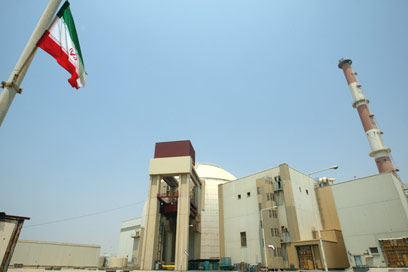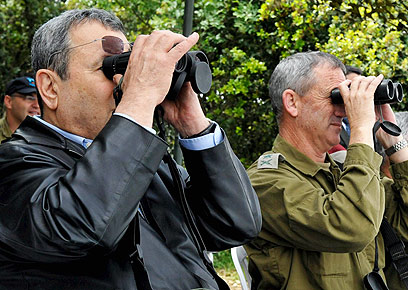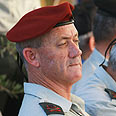Major-General Benny Gantz is a worthy and fitting army chief candidate. He possesses a wealth of experience and held various field posts at all levels. He also gained experience and succeeded in several senior General Staff positions, most significantly as deputy chief of staff.
Gantz is thoroughly familiar with the IDF's operational plans and is well familiar with the readiness level of the army and its various units. As deputy army chief he was also involved in formulating the IDF's next multiyear work plan and he is familiar with the army's procurement plans. The fact that the Americans also know him, as the military attaché in Washington, is another important asset to his credit.
In conversations with him it was evident that Gantz was an active participant in formulating the defense establishment's strategy and shaping the IDF's new operational doctrine; hence, on these fronts we can assume that he will follow in the footsteps of his predecessor, Chief of Staff Gabi Ashkenazi.
Less belligerent than Galant
During his term as deputy army chief, Gantz dealt extensively with the Iranian nuclear threat and believed that the IDF and home front must be quickly prepared for the challenge, to enable a strike in Iran if and when the political leadership orders it.Gantz has refrained from voicing his opinion, at least to people outside the army, on whether an Iran strike should be carried out at all and under what circumstances. We can assume, however, that on this front too he will hold views that our similar to Ashkenazi's and different than the belligerent line that would have been adopted by Major General Galant had he been appointed army chief.

Familiar with Iran threat (Photo: AFP)
However, Gantz' command style will apparently be different. He tends to enforce his authority less than Ashkenazi, seeks to hear different views, and hesitates more than Ashkenazi before taking decisions.
The army chief-designate prefers to build consensus among IDF generals before taking major decisions in order to ensure their execution. On this front he is reminiscent of the style adopted by then-Chief of Staff Shaul Mofaz before and during the second Intifada. Some current and past generals are holding this against Gantz and in this context mention his conduct during the Second Lebanon War.
Can he handle Barak?
At the time, Gantz served as chief of the arm in charge of building the IDF's infantry power. He believed early in the war that reserves should be called up and large forces should be deployed in southern Lebanon, in order to quickly tilt the balance in Israel's favor and minimize the rocket fire. In retrospect, his proposal was proven correct. Gantz shared his view with then-Army Chief Dan Halutz and during meetings at Northern Command headquarters. Yet when his opinion was not accepted he did not pound the table or undertake major efforts in order to prompt military and political leaders to adopt his view.
Barak and Gantz (Photo: Ariel Hermoni, Defense Ministry)
Those who make note of the above fear that Gantz's tendency not to confront his superiors would hinder his ability to stand up for his views in meetings with the defense minister and cabinet. This is especially true with a dominant defense minister like Ehud Barak breathing down his neck.
On the other hand, Gantz's proponents note that as opposed to Galant, the former deputy army chief does not owe his appointment to the defense minister and will therefore not feel obligated to toe Barak's line.
Obstacles ahead
The public sphere and the military still feature several fresh mines planted during Galant's candidacy. Until these mines are disarmed, the IDF's top echelon and the Israeli public will not be spared the great confusion and embarrassment they now face.The recommendation to appoint Gantz may prompt various objections. On this front, there are two main charges against him. First, that as commander of the Judea and Samaria Division he did not operate with determination in order to save Border Guard Officer Madhat Yusuf, who was gravely hurt at the Josef Tomb battle and later died, even though Gantz had at his disposal a force that was ready to stage a rescue operation. Such argument would likely be rejected by the High Court, because in this matter Gantz operated in line with explicit instructions from the army chief and defense minister.
A second charge is that Gantz, similarly to Galant, built a balcony and wall on public land near his home. This argument will also likely be rejected, because unlike Galant, Gants followed the orders of authorities and demolished the balcony and supporting wall.
The last landmine is the state comptroller's probe of the Harpaz document. Gantz did not play a key role in the affair, yet the comptroller may criticize him because he saw the forged document or knew about it but did nothing about it.
The publication of the comptroller's conclusions may prompt another earthquake that would shake up the defense establishment and IDF, and greatly hinder Gantz in restoring normalcy among the army's top echelon. This may present a complicated test for Gantz and his ability to carefully maneuver in the military and public sphere for some months at least. On this front we can hope that Gantz's composure, as well as the integrity and wisdom he showed thus far, would ultimately enable him to settle down the defense establishment and resume its normal work.
- Follow Ynetnews on Facebook

Major General Gantz
Photo: Shaul Golan
מומלצים















